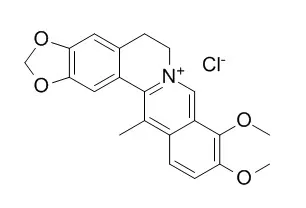| Cell Research: |
| Life Sci. 2003 Aug 1;73(11):1401-12. | | Effects of 13-alkyl-substituted berberine alkaloids on the expression of COX-II, TNF-alpha, iNOS, and IL-12 production in LPS-stimulated macrophages.[Pubmed: 12850501] | Berberine, a major alkaloidal component of Coptidis Rhizoma, has antibacterial activity, anti-inflammatory effect, antitumor and antimotility actions. We suggested that one of possible mechanisms of anti-bacterial activity of berberine may be based on the production of interleukin (IL)-12. Recently 13-alkyl-substituted berberines were shown to be better activity than berberine against certain bacteria species and human cancer cell lines.
METHODS AND RESULTS:
In the present study, therefore, the effects of 13-Methylberberine (13-MB) and 13-ethylberberine (13-EB) on the production of IL-12 and expression of iNOS, TNF-alpha and COX-II were investigated using macrophages in culture. In LPS-stimulated RAW 264.7 cells, these alkaloids decreased the nitrites, concentration-dependently. The concentration of 50% inhibition of NO production (IC50) by 13-MB and 13-EB was 11.64 and 9.32 microM, respectively. The suppressed expression of iNOS protein was responsible for the reduction of NO production. Neither the expression of mRNA of iNOS, COX-II and TNF- alpha nor protein of COX-II and TNF-alpha was affected by both 13-MB and 13-EB, but production of PGE2 in LPS-stimulated RAW 264.7 cells was significantly reduced. Another striking finding of the present study is that 13-MB and 13-EB increased production of IL-12 in LPS-treated splenic macrophages.
CONCLUSIONS:
These results indicate that posttranscriptional regulatory mechanism of iNOS gene expression by 13-MB and 13-EB is involved, and COX-II activity is inhibited by 13-MB and 13-EB, respectively. In conclusion, the present study demonstrates that 13-methyl- and 13-ethylberberine alkaloids can be useful as an immunotherapeutic compound for induction of IL-12, which is potentially applicable for tumors, infectious disease, and airway inflammation. |
|






 Cell. 2018 Jan 11;172(1-2):249-261.e12. doi: 10.1016/j.cell.2017.12.019.IF=36.216(2019)
Cell. 2018 Jan 11;172(1-2):249-261.e12. doi: 10.1016/j.cell.2017.12.019.IF=36.216(2019) Cell Metab. 2020 Mar 3;31(3):534-548.e5. doi: 10.1016/j.cmet.2020.01.002.IF=22.415(2019)
Cell Metab. 2020 Mar 3;31(3):534-548.e5. doi: 10.1016/j.cmet.2020.01.002.IF=22.415(2019) Mol Cell. 2017 Nov 16;68(4):673-685.e6. doi: 10.1016/j.molcel.2017.10.022.IF=14.548(2019)
Mol Cell. 2017 Nov 16;68(4):673-685.e6. doi: 10.1016/j.molcel.2017.10.022.IF=14.548(2019)